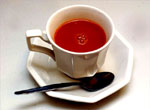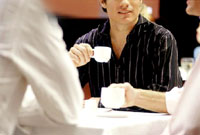'Although preliminary research indicates that quercetin
might be involved in
causing cancer, more recent work suggests that high intakes
of
bioflavonoids, which are strong antioxidants, are
associated with a decreased risk of Cancer and Heart Disease' |
||||
| Tea a Gentle Stimulant | ||||
people suffering from peptic ulcer should avoid strong black tea because,
light coffee,it stimulates acidic, gastric,seretion and may cause irritation;
insted, they should drink weak tea with milk. Tea as also been known
to precipitate MIGRAINE in sensitive individuals; it is not known,
however, whether this is due to its bioflavonoid or its caffeine content. |
| Nilgiris Tea |
 Tea is a Part of a Healthty Life Style, The key to a healthy lifestyle include a balanced diet, low in fat, and rich in fruits, vegetables whole grains, regular exercise and not smoking. Tea drinking can be a part of this plan. |
| Tea & Health |
| Antioxidants in Tea |
Black tea provides approximately 20mg of flavinoids antioxidant per cup. It is a natural and more potential source of Anti - Oxidats than most fruits, vegetablsand other beverages. Tea flavinoids shown strong antioxidat activity and moer powerful than vitamin C and E. |
| Tea and Cardio Vascular Disease |
Cardio vascular disease cause due to the accumulation of lipid mostly cholesterol, in the inner layers of the arteries (blood vessels). This is caused by high level of low density liprotein and LDL Oxidation which results in platelet aggregation and thromboxaine formation. Black tea consumption reduces the risk of the heart disease and stroke. Studies have shown that the tea flavinoids protect low density lipoproteins from oxidation, inhabit plasam lipid per oxidation and inhabit ploatelet aggregation and thromboxaine formation |
| Tea and Cancer |
Studies an animals shown that tea polyphenols are effective Cancer preventive agents. Tea flavinoids possess bio chemical properties which prevents cancer. |
| Tea and Skin care |
 Chronic
damage by UV light can lead to skin cancer. Emerging research result
show tea to protect skin from damage and inflammation caused
by UV. Effetct appears to be the same whether tea is drunk or applied
as a topical agent. Thus tea is becoming increasingly popular as
a ingredient in various beauty products. As per the emerging scientific
evidence tea is a beverage that revives the body by rapid physiological
stimulation and mind by increased
mental alertness improve in mood and reduction in fatigue. Chronic
damage by UV light can lead to skin cancer. Emerging research result
show tea to protect skin from damage and inflammation caused
by UV. Effetct appears to be the same whether tea is drunk or applied
as a topical agent. Thus tea is becoming increasingly popular as
a ingredient in various beauty products. As per the emerging scientific
evidence tea is a beverage that revives the body by rapid physiological
stimulation and mind by increased
mental alertness improve in mood and reduction in fatigue. Tea consumption relax the body through increased vasodilation of skin blood vessels and mind by reducing the feelings of anxiety. |
| Tea and Oral Health |
Tea flavinoids show inhabiting growth of oral bacteria and enzymes responsible for formation of plague.
|
| Herbal Tea |
These teas, tisanes or infusions made from the leaves, blossoms and fruitsof many plants, have become increasingly popular. Many are credited with medical benifits although there is as yet little scientific evidence to justify. |
